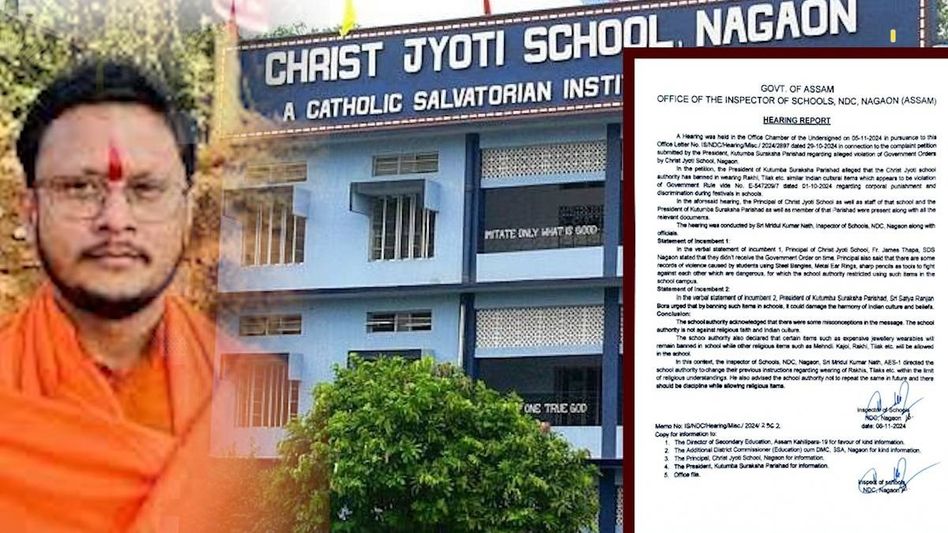Assam: Controversy over 'Rakhi' and 'Tilak' ban resolved; Nagaon school to allow cultural symbols
Satya Ranjan Borah argued that the restriction on cultural symbols like Rakhi and Tilak could negatively affect the harmony of Indian traditions and beliefs, particularly among students who view these symbols as integral to their cultural identity.
 Assam: Controversy over 'Rakhi' and 'Tilak' ban resolved; Nagaon school to allow cultural symbols
Assam: Controversy over 'Rakhi' and 'Tilak' ban resolved; Nagaon school to allow cultural symbolsIn a hearing held on November 5, 2024, the Inspector of Schools, Nagaon, addressed a complaint submitted by the President of the Kutumba Suraksha Parishad and Assam Hindutva Leader Satya Ranjan Borah alleging that Christ Jyoti School in Nagaon had violated government regulations by banning the wearing of cultural items such as Rakhi and Tilak within the school premises.
The hearing, conducted by Mridul Kumar Nath, Inspector of Schools, Nagaon, was attended by both the school authorities and members of the Kutumba Suraksha Parishad, including the President, Sri Satya Ranjan Bora. The proceedings followed a petition submitted on October 29, 2024, where the Kutumba Suraksha Parishad raised concerns that the ban infringed upon Indian cultural practices and traditions, especially during religious festivals.
In his verbal statement, Fr. James Thapa, the Principal of Christ Jyoti School, clarified that the school had not received the relevant government order in time and explained that the ban on wearing certain cultural items like Rakhi and Tilak was implemented as a safety measure. He cited previous incidents where students used steel bangles, metal earrings, and even sharp pencils as tools during fights, posing potential risks of injury. The school, therefore, decided to restrict such items to maintain discipline and ensure student safety.
On the other hand, Satya Ranjan Borah, argued that the restriction on cultural symbols like Rakhi and Tilak could negatively affect the harmony of Indian traditions and beliefs, particularly among students who view these symbols as integral to their cultural identity.
Borah’s concerns stemmed from a recent notice sent to students by Christ Jyoti School, prohibiting the wearing of symbols integral to Indian culture, such as Tilak, which are seen as representations of Indian philosophies. This move was criticized by Borah, who pointed out that it contradicted a clear directive issued by the Assam Education Department, which stated that Indian cultural symbols, including Tilak, should not be banned in schools.
In response to these actions, Borah raised questions about whether the school had received the government’s official instructions in time. He demanded clarification on why the school continued to enforce such restrictions despite clear guidelines from the state authorities. The issue came to light when a concerned parent reached out to Borah, prompting him to take the matter up with both the Education Department and the local district administration.
Speaking on the issue, Borah said, “These actions go against the very spirit of Indian culture and our constitution, which upholds freedom of expression, including the right to wear symbols of one’s belief and heritage.” He stated the need for schools to adhere to government instructions that promote cultural and religious freedom in educational environments.
Also Read: IIT Guwahati hosts healthcare symposium to boost medical innovation in northeast
Copyright©2024 Living Media India Limited. For reprint rights: Syndications Today









